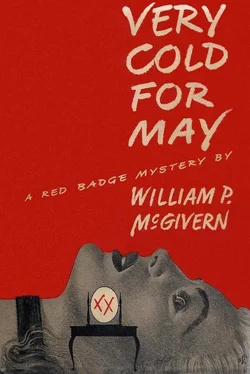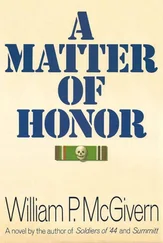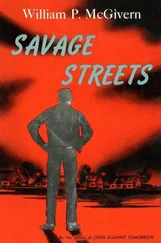Jake said, “Mr. Riordan told us you could give us a picture of what we’re going to be up against in this investigation. I’m an ignoramus about figures, so don’t expect too much from me.”
Meed smiled mechanically. “I will try to clarify any points you find confusing.” Zippering open his brief case he placed two manila folders before Jake. “These statements cover the operations of the Riordan Mills and the Riordan Casting Company through 1943–1945.”
Jake leafed through the two folders and saw that each contained summations of the various transactions, liabilities, assets, and balances of the two companies. The statement of net profit in each case was impressive.
“You did okay during the war,” he said.
“Yes,” Meed said.
Jake closed the folders. “Frankly, these things don’t help much. Riordan told us the other night he had arbitrarily ignored certain government specifications in casting gun barrels. Is that all he did?”
“Basically, that is what happened.”
“Then the government is likely to call him a crook, I imagine.”
Meed smiled. “The government has to prove that. You know what happened because Mr. Riordan was frank with you; but we don’t need to be so frank with the government.”
“How about the companies’ books? Won’t they tell the story?”
Meed’s smile was pleased. “Books, Mr. Harrison, can tell many stories. You see, a set of books, kept with diligence and imagination, is in some respects like a dense, unmapped forest — quite impassable unless one knows where to look for trail markings.”
“I see. Now check me if I’m wrong. Riordan deliberately used a cheaper grade of steel than specified in his contract, but the government men aren’t likely to find that out from your official records. Is that right?”
“Yes.”
“Then how did the Hampstead Committee get on Riordan’s trail in the first place?”
Meed shrugged his neat shoulders.
“There were several cases of premature detonation in barrels cast by our firm. I believe some personnel were killed in at least two of the accidents. Reports made out by company commanders and ordnance inspectors took a long time to reach a level where they could be examined with any effect, but inevitably that happened, and the Riordan Casting Company was discovered to be the maker of the defective barrels. Hence this investigation.”
Jake leaned back in his chair and fiddled with a pencil. Then he glanced at Meed. “What’s your personal idea about this? I mean, do you think Riordan was justified in using cheap steel considering that men were killed as a result of that action?”
Meed appeared surprised. “I have no opinions on the subject,” he said. “Perhaps,” he added, smiling, “I’m an unemotional man. The unnecessary death of American soldiers was an unhappy development, of course, but I see little point in applying moral terminology to the situation. The facts exist in a different light for everyone. Take the soldiers, for example— the fact of their death means one thing to their families; to me, it means a complication in the running of an industrial concern. I would be called heartless for that attitude, but that wouldn’t change my feelings, you see.”
“I see,” Jake said drily. “No one could accuse you of letting your heart guide your head. But tell me this: Do you know a woman named May Laval?”
Meed paused. Then he said, “No, I never had that pleasure. I understand from this morning’s papers that I never will.”
“Maybe you know she had a diary supposed to contain information about Riordan.”
“Yes, I knew that.”
“Well, the diary has disappeared. Supposing it turns up. What then?”
“I see what you mean. Yes, the information in the diary might provide a clue to this investigating committee. That is a chance we must take, since there’s nothing else we can do about it.”
Jake realized that he had learned little from Meed. But it was encouraging to know that the facts of Riordan’s manipulations were safely buried in labyrinthine records. The harder the body was to find the longer they could insist that there wasn’t one in the first place.
As Meed was replacing the folders in his brief case, Jake said, “By the way, do you know where Riordan was this morning — early, I mean? About four, say.”
Meed looked directly at Jake and smiled. “Oh, yes. Mr. Riordan was called to Gary, Indiana, last night. He stayed over until this morning with his plant manager.”
Noble could relax now, Jake thought.
Niccolo walked in as Meed was preparing to leave. Jake introduced them, and Meed smiled impersonally, then excused himself and left.
“Who was that?” Niccolo said.
“One of Riordan’s smooth little cogs,” Jake said. “Avery Meed. Very sharp.”
“That’s good,” Niccolo said. “We need brains on our side. I’ll see you around.”
When he left, Jake strolled to the windows and stared down at the magnificent panorama of the city, unreal and mysterious in the smoky fall weather. From the height of his office he could see the clean sweep of the Outer Drive and its six lanes of hurtling traffic, and the iron-gray background of the lake spreading and merging indistinguishably into the somber horizon. He watched the microscopic movement of people hurrying along the sidewalks, massing momentarily at stop lights like ants meeting an unexpected obstacle, and then spilling onward again when the signals changed.
Jake sighed and went back to his desk. He worked for a few hours, accomplishing little. He was glad when his phone rang. It was Noble.
“Jake, get down to my office right away. Damn it, all hell has broken loose.”
The crisis tone was in his voice.
Jake said okay.
Noble was pacing up and down before his desk when Jake walked in, and the expression on his normally beaming face would have fitted a man whose brokers had sold him short on the same day his wife had run off with a best friend. When he saw Jake he threw up his hands in dramatic despair.
“We’ve been had, Jake,” he said hoarsely. “Look.” He grabbed a paper from his desk and pointed a trembling forefinger at a story that ran about sixty per cent of column one on the front page.
There was a picture and an account of May’s murder on the same page, but Noble was referring to another story, one which had been given to the papers by Gregory Prior.
Jake sat on the edge of Noble’s desk and ran quickly down through the column. Prior had explained that his job was to investigate certain of Mr. Dan Riordan’s wartime contracts, and to pass on his findings to the Senatorial committee. That much was okay.
The lead pipe descended in the last paragraph. There Prior was quoted as saying:
“... Mr. Riordan’s high-powered press representatives have already sought me out, and have attempted to present their client to me as a man who did no worse than many others. Naturally, I do not intend to be influenced by these paid apologists...”
There was more, but Jake tossed the paper down, and said, “Well, I’ll be damned.”
“Where did he get that story?” Noble said desperately.
“From me,” Jake said. “I met Prior at May’s this morning, and tried to creep into his heart. My charms are fading, I guess.”
“What the hell are we going to do?”
“I’ll tell you what,” Jake said. “I’m going to make that well-scrubbed bastard regret that he ever came near Chicago. The first thing I’ll do—”
Noble’s phone interrupted him. Noble picked up the receiver, and flashed a glance at Jake. “Yes, Mr. Riordan, we’ve seen it,” he said.
Jake saw the perspiration beading Noble’s forehead. “That story was a mistake,” Noble said, with a wave at Jake. “All a mistake. You see...”
Читать дальше












